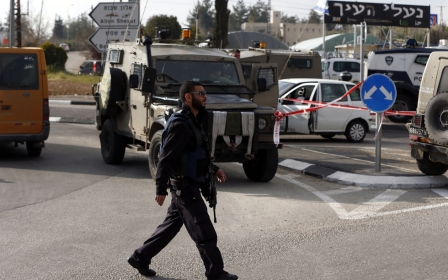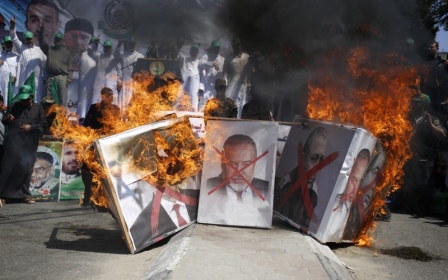Netanyahu offers to meet Abbas in Paris, but rejects French peace push

Israeli Prime Minister Benjamin Netanyahu rejected a multilateral French peace initiative as he met his French counterpart on Monday, offering instead to hold direct talks with Palestinian president Mahmud Abbas in Paris.
French Prime Minister Manuel Valls said he would speak to President Francois Hollande about Netanyahu's proposal.
"It can still be called the French initiative because you would host this genuine effort for peace," Netanyahu said.
"But here's the difference: I will sit alone, directly, with president Abbas in the Elysee (French presidential) palace or anywhere else that you choose. Every difficult issue will be on the table."
Netanyahu, who has repeatedly expressed his opposition to the French proposal, said "this initiative can still take place in Paris, because that would be a marvellous place to sign a peace accord. It's a marvellous place anyway."
Valls is visiting Israel and the Palestinian territories to advance his country's plan to restart Israeli-Palestinian peace efforts.
He is due to hold talks in Ramallah on Tuesday with Palestinian prime minister Rami Hamdallah.
Abbas has welcomed the French initiative to hold a meeting of foreign ministers from a range of countries on 3 June, without the Israelis and Palestinians present.
Another conference would then be held in the autumn, with the Israelis and Palestinians in attendance. The goal is to eventually restart negotiations that would lead to a Palestinian state.
Netanyahu has regularly called for direct talks and offered to meet Abbas, and he reiterated his argument on Monday that peace would not be achieved though "international diktats."
Palestinian leaders say years of negotiations with Israel have not ended its occupation and have pursued a strategy of diplomacy at international bodies.
Negotiations between the Israelis and Palestinians have been at a standstill since a US-led initiative collapsed in April 2014.
An upsurge in violence since October has killed at least 205 Palestinians and 28 Israelis, though the unrest has steadily declined in recent weeks.
Most of the Palestinians killed were carrying out knife, gun or car-ramming attacks, Israeli authorities say.
Many analysts say Palestinian frustration with Israeli occupation and settlement building in the West Bank, the complete lack of progress in peace efforts and their own fractured leadership have fed the recent unrest.
Israel says incitement by Palestinian leaders and media is a main cause of the violence.
Those arguing for a new peace effort say the lack of any initiative leaves a vacuum that can be filled by hardliners on either side.
Valls has sought to address Israel's concerns over the French initiative, saying it would not try to impose a solution and that negotiations between the two sides would ultimately resolve the conflict.
He has at the same time criticised Israeli settlement building in the occupied West Bank, considered a major stumbling block to peace.
Jewish settlements in the West Bank are considered illegal under international law and built on land the Palestinians see as part of their future state.
Valls' visit also comes at a time of political turbulence in Israel, with Netanyahu expected to soon finalise negotiations with the party of hardliner Avigdor Lieberman to join his coalition.
Lieberman, who lives in a West Bank settlement and is detested by the Palestinians, is expected to take on the key role of defence minister.
Netanyahu has sought to ease concerns over the expected entrance of Lieberman's party into his coalition, saying his government would still seek peace with the Palestinians.
Stay informed with MEE's newsletters
Sign up to get the latest alerts, insights and analysis, starting with Turkey Unpacked
Middle East Eye delivers independent and unrivalled coverage and analysis of the Middle East, North Africa and beyond. To learn more about republishing this content and the associated fees, please fill out this form. More about MEE can be found here.




